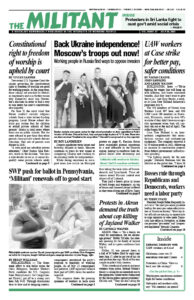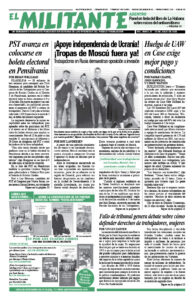In a serious blow to political rights, a Ukrainian administrative court in Lviv July 5 upheld the government’s longstanding ban on the Communist Party and the Happy Ukraine Party. Both were among the 11 parties ordered shut down by President Volodymyr Zelensky in May on trumped up charges of having “links with Russia.” Most of those parties in fact oppose Moscow’s invasion and join in Ukraine’s fight for independence.
These bans take advantage of Moscow’s assault to push a broader drive by Ukraine’s capitalist rulers to attack the rights of working people. This includes the Zelensky government’s new anti-labor code, which allows bosses to rip up contracts workers won setting wages and conditions, impose longer hours and give bosses the power to fire workers without notice.
The court announced the state’s seizure of all the Communist Party’s “property, funds, and other assets,” along with “its regional, city, district organizations, primary centers and other structural entities.” Kyiv’s moves to ban the CP date back to 2015.
The Happy Ukraine Party is led by Oleksandr Klymenko, a former minister in the brutal Moscow-backed regime of Viktor Yanukovych, which was toppled by the working-class Maidan upsurge in 2014.
After that victory, the new government of then President Petro Poroshenko — himself a large-scale capitalist boss — passed thought-control “decommunization” laws outlawing all communist political views and activities, and making it illegal to deny “the criminal character of the communist totalitarian regime of 1917-1991 in Ukraine.”
In fact, the communist-led workers and farmers government led by V.I. Lenin and the Bolshevik Party that came to power in 1917 unconditionally granted Ukraine the right to self-determination. Like all of Lenin’s revolutionary policies, this was overturned in a counterrevolution led by Joseph Stalin.
The government’s bans are a deadly threat to the working class, setting a dangerous precedent that can and will be used against others, including all those that fight to advance the interests of the working class.

